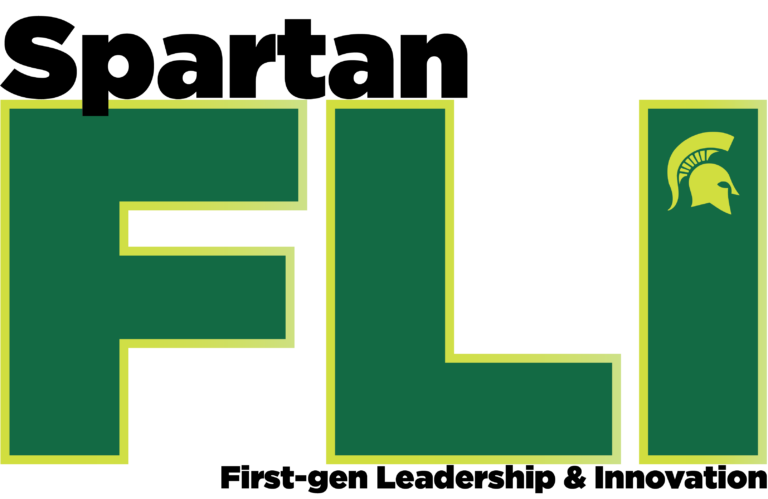 In February of this year, Michigan State University received a generous $17 million gift from Martin J. Vanderploeg, MSU alumnus and president and chief executive officer for Workiva, Inc. More than 70% of this gift has been allocated for a signature program to help first-generation students succeed in their college careers.
In February of this year, Michigan State University received a generous $17 million gift from Martin J. Vanderploeg, MSU alumnus and president and chief executive officer for Workiva, Inc. More than 70% of this gift has been allocated for a signature program to help first-generation students succeed in their college careers.
After months of planning, this program is now coming to fruition. Designated the Spartan First-Generation Leadership and Innovation Program (FLI), the first cohort of students participating in this innovative approach to first-generation student engagement will start this coming fall semester.
Understanding that first-generation students persist and graduate at higher rates when they are supported both inside and outside the classroom, this new program is working to enhance MSU’s capacity to serve first-generation students. The Spartan FLI program is creating more opportunities for first-generation student success while closing opportunity gaps, all in a broader effort to hit the university’s strategic plan goals for 2030.
While the university already has robust first-generation focused programs and resources, this new iteration of first-generation programs is working with a smaller subset of students. “It’s designed to be a smaller cohort program that will proactively, intrusively, and in a personalized way, serve first-gen students,” said Perry Fittrer, deputy director of the Neighborhood Student Success Collaborative (NSSC) and director of the Office of Supportive Services. “Where other MSU first-gen programs, like TRIO SSS, have nearly 600 students involved, this is going to be a cohort of about 50 students. We anticipate only bringing in about 10 to 15 students in each incoming class.”
For this first class of students, Perry and his team focused on first- and second-year students. Intentional and targeted outreach was used to identify this first cohort, with a concerted effort not to pull students away from MSU’s other outstanding first-gen and scholar programs like Dow STEM, Detroit M.A.D.E. or TRIO SSS. “The program is mainly designed to be a first- and second-year program. During students’ third and fourth year it is more of an opportunity for them to serve in a mentorship role within the program and give back to other first-gen students,” Perry explained. “The program is aimed at developing first-gen leaders on campus through this mentoring model, with the hope that during those third and fourth years, students transition into TRIO or other programs to access resources to best serve them at that stage in their experience,” he added.
A primary focus is making this program accessible, without an excessively competitive application process. Students interested in being part of the Spartan FLI program submit an application online with a short essay component as a way for them to articulate why they are interested in being part of the program and how they feel it would be beneficial for them and their time at MSU. As the program grows and expands, so may the application process, but access and achievability will be at the core of any process improvements.
Another intent of the program is to provide a “multi-level support system” to students involved. Additional staff members will be added to work specifically with students in the program, with ambitious goals of persistent and regular one-on-one student engagement throughout their first and second years. There are also plans to develop a peer support network, a future summer bridge program, career prep courses and services, access to high-impact practices like internships, undergraduate research and study away/abroad, as well as direct engagement with the families of student participants.
The Spartan FLI program helps MSU do things in the first-generation student engagement space that may not otherwise be possible. “We have the flexibility to innovate for first-gen students in ways that we can’t do with other programs. Being privately funded by our generous donor Martin Vanderploeg, we can do new and different things. One of the bigger things we’re able to offer is a $2,000 scholarship for every student in the program,” said Perry. “Additionally, when students are pursuing some of the high-impact practices on campus, those can incur a significant cost and have a great opportunity cost for students, so a large portion of the program’s budget is dedicated to providing scholarships to students pursuing those activities,” he explained.
What’s starting this fall with the Spartan FLI program is another new beginning in how MSU helps first-generation students succeed. As the program enters its first year, Perry and his team will continue to develop and plan effective ways to close opportunity gaps for first-gen students and meet MSU’s strategic 2030 goals. Creating a sense of belonging and providing a space for first-gen students to be seen and heard will positively impact their experience during and after their time at the university. As the program evolves, so will MSU’s approach to first-generation student success, with an ultimate hope of bringing similar opportunities to other students across campus.
To find out more about the Spartan FLI program, and how you can support first-gen students at MSU, visit firstgen.msu.edu/fli-vanderploeg-scholars. While there you’ll learn even more about why MSU earned the Center for First-generation Student Success’s “First-Gen Forward” Cohort designation which is granted to institutions displaying an ongoing commitment to first-gen student success.